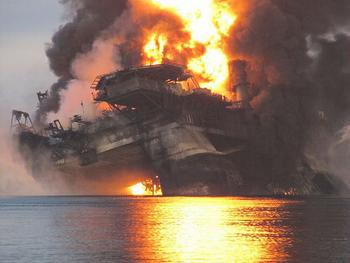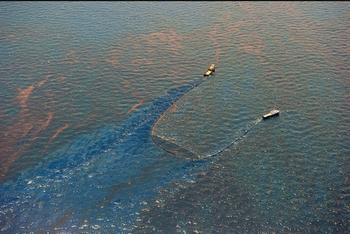Investors Worth Trillions Pump Oil Companies for Risk Reduction Strategies
BOSTON, Massachusetts, August 6, 2010 (ENS) – Suffering deep financial losses from the Deepwater Horizon oil spill in the Gulf of Mexico, and in response to a proliferation of deepwater offshore drilling for oil worldwide, investors have sent a joint letter to 27 major oil companies seeking transparency on risk reduction strategies for their offshore oil operations.
Fifty-eight investors in the United States and Europe, representing trillions of dollars in assets, sent the request for more information to chief executive officers at the oil companies, including the world’s three largest deepwater oil producers – ExxonMobil, Royal Dutch Shell and Brazil’s state-owned oil company Petrobras.
“The shareholder harm that has flowed from the BP spill has focused investor attention on governance, compliance and management systems needed to minimize risks associated with deepwater offshore oil and gas development worldwide,” the investors wrote. “The BP Gulf of Mexico disaster has also raised concerns about response plans by companies and the industry for dealing with offshore accidents.”
 |
The Deepwater Horizon oil rig, leased and operated by BP, sinks in the Gulf of Mexico, April 22, 2010. (Photo courtesy U.S. Department of Energy) |
The investors did not send their letter to BP or Anadarko Petroleum, which jointly owned the Deepwater Horizon rig that exploded April 20, causing the world’s worst spill that sent 4.1 million barrels of oil into the waters of the gulf.
Investors have seen BP’s stock fall by more than a third since the spill.
“The gulf tragedy provided dramatic evidence that investors and pensioners have high stakes in deepwater oil exploration. In my state alone, the nation’s two largest public employee pension funds have seen the value of their BP holdings plummet by $349 million,” said California State Treasurer Bill Lockyer, who serves as a trustee on the board of CalPERS and CalSTRS, which have a combined $337 billion in assets.
“Our message is simple,” said Lockyer. “Investors have a right to full disclosure of the risks associated with oil companies’ offshore operations, and the prevention, response and governance measures they have in place to minimize those risks.”
A second letter was sent by most of the same investors to 26 insurance companies that provide insurance for offshore drilling activity. This letter asks if insurers are considering adjustments to their overall exposure to offshore oil and gas operations, including possible changes in policy volume. It asks if the insurers are considering changes in their underwriting criteria and if they are supportive of new regulations that would reduce offshore drilling risks.
Swiss Re has estimated that total insured losses for all affected parties from the BP rig explosion and spill could top $3.5 billion. This figure would surpass the $2.2 to $2.5 billion in annual insurance premiums worldwide for oil and gas exploration.
Earlier this week, the U.S. Senate leadership shelved a bill that would eliminate the cap on oil spill liability. The Senate will resume consideration of The Clean Energy Jobs and Oil Spill Accountability Act when it returns from August recess.
Senate Majority Leader Harry Reid said, “It’s a sad day when not even a single Republican will support a bill that would create up to 700,000 clean energy jobs, and hold BP accountable for the cost of its disaster.”
But American Petroleum Institute President and CEO Jack Gerard said on behalf of the industry, “Unlimited liability for spill damages would force most oil and natural gas companies out of the Gulf of Mexico because they would be unable to purchase insurance. This would put thousands of American jobs at risk and reduce the energy supplies we get from the Gulf.”
 |
Boats skim oil spilled by BP from the surface of the Gulf of Mexico, showing the blue water beneath. June 19, 2010. (Photo by James Duncan Davidson) |
With their letters, the investors are attempting to increase the safety of deepwater oil exploration for the oil companies, their insurers, the American taxpayers and the environment as well as for oil company shareholders.
“Investors are by definition risk takers, but our risks need to be calculated and measured,” said New York State Comptroller Thomas DiNapoli, sole fiduciary of the NYS Common Retirement Fund.
“Investors have a right to know that our companies are taking all necessary steps to maximize opportunities without sacrificing safety,” said DiNapoli. “We believe improved practices and policies to mitigate risk will ultimately improve the bottom line, which is good for all investors.”
The letters come as the U.S. and several other countries re-examine offshore safety regulations amid a proliferation of deepwater wells in the world’s oceans.
Deepwater oil production has tripled since 2000 to five million barrels a day and is projected to double again by 2015. There are now 14,000 deepwater wells worldwide, the investors note.
“Investors are rightly raising questions about whether and how the rest of the oil industry is prepared to manage the risks associated with the industry’s move toward increasingly extreme water depths and operating conditions to find oil,” said Andrew Logan, oil program director at Ceres, a network of investors and environmental groups which helped organize the investor letters.
“The BP disaster demonstrates that the shift to deeper waters comes with a significantly increased risk profile, and that the cost of getting environmental risk management wrong has increased dramatically,” Logan said.
The letter to oil companies includes questions on five key topics:
- company investments in spill prevention and response activity, including offshore drilling and spill response capability
- spill contingency plans for managing deepwater blowouts
- lessons learned from the BP spill, including their position on possible new regulations and more robust enforcement on offshore drilling in the Gulf and elsewhere
- possible actions to improve their safety contractor selection and oversight practices
- governance systems for overseeing management of offshore oil and gas operations
Oil companies are asked to respond by November 1.
“The Deepwater Horizon disaster was a game-changer for shareholders,” said Pennsylvania State Treasurer Rob McCord. “It demonstrated the catastrophic consequences that can result when firms fail to provide essential risk assessment. Information is power – and it helps investors manage risk.”
“Would I invest in an offshore drilling company if its disclosure statement revealed that its ‘rapid response’ to a catastrophic oil spill involved the unproven technique of stuffing golf balls, hair clippings and shredded tires down a well? said McCord. Probably not.”
Copyright Environment News Service (ENS) 2010. All rights reserved.
© 2010 – 2012, Environment News Service. All rights reserved. Content may be quoted only with proper attribution and a direct link to the original article. Full reproduction is prohibited.
